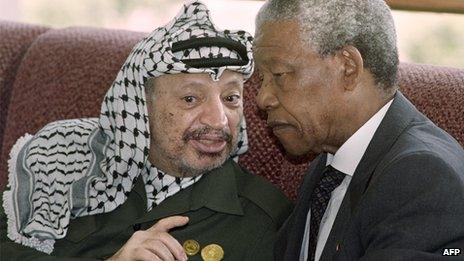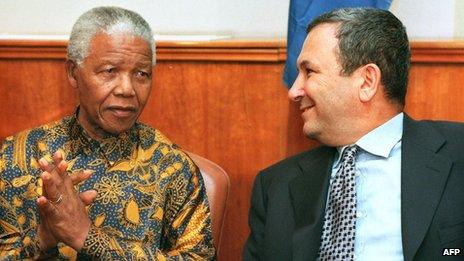Mandela's mixed legacy for the Middle East
- Published

There was a genuine personal warmth between Arafat and Mandela, according to a former Palestinian official
We may never see another life like Nelson Mandela's; and so there may never be a death quite like his either.
The man who repaid persecution with patience and racism with reconciliation came to be seen as a kind of embodiment of our noblest instincts for making peace.
He chose the difficult path of forgiveness and togetherness when he could have been forgiven for choosing the way of bitterness and vengeance.
So its not surprising that in many places of division rival sides scramble to place their ties with Mandela in the best possible light and to claim the legitimacy that confers.
Nowhere more, of course, than in the Middle East.
The truth is that Mr Mandela did not embroil himself much in the conflicts of others - perhaps naturally wary of diluting his enormous moral authority by spreading himself too thinly around the world's areas of conflict.
The Middle East is one area though where we know quite a bit about Mr Mandela's connections and his thoughts and feelings.
Mutual admiration
The Palestinians have the easiest case to make in claiming Mr Mandela's blessing for their cause.
During his long years in jail as an ANC prisoner he was embraced by the PLO leadership as a fellow-fighter in a kind of global family of liberation movements.
Muammar Gaddafi of Libya and Cuba's Fidel Castro also provided political and material support during the ANC's long years in the wilderness.

Mandela visited Israel but was critical of its policies towards the Palestinians
Mr Mandela never forgot it either, even when the political winds changed and he was a global superstar while some of his old allies found themselves on the losing side of history.
When Yasser Arafat died he called him "an icon in the proper sense of the word".
He also said simply: "Yasser Arafat was one of the outstanding freedom fighters of his generation... It is with great sadness that one notes that his and his people's dream of a Palestinian State had not been realised."
The former foreign minister of the Palestinian Authority Nabil Shaath, who came to know Nelson Mandela personally, said there was a genuine personal warmth between Arafat and Mandela that underlined the political link between them.
And he said Palestinians had much to learn from the ANC about maintaining the momentum of a global campaign through long years of struggle.
He told the BBC: "I think they waged the world's best-ever campaign [to end apartheid] and there's a lot to learn from that, as well as the lesson of reconciliation."
Advice to Israel
At a moment when anyone with a claim to a share in the Mandela legacy is proud to make that connection, Israel has a painfully difficult case to make.
It was a close, if secretive, ally and arms supplier apartheid South Africa and there is a good case to be made that Israeli support helped the all-white regime in Pretoria to last longer than it otherwise might have.
There have been stories - which are difficult to substantiate definitively - that the co-operation extended into Israel sharing nuclear weapons technology.
Mr Mandela observed sharply that when he was finally released from prison he received invitations to visit "from almost every country in the world, except Israel".
When Israel did begin issuing invitations (as many as four in the course of the 1990s) Mr Mandela was in no hurry to accept.
And its no coincidence that when he did come in 1999 it was at a moment when the then Israeli Prime Minister Ehud Barak seemed close to a peace deal with the Palestinians - Mr Mandela must have hoped his presence might give some kind of final push.
It didn't as it turned out but Mr Mandela did spell out his attitude to the core of the problem when he went to the Israeli Foreign Ministry.
He was quoted as saying: "Talk of peace will remain hollow if Israel continues to occupy Arab territories... I understand completely well why Israel occupies these lands. There was a war. But if there is going to be peace, there must be complete withdrawal from all of these areas."
'New page'
There was no doubt that Israel's ties to the ugly apartheid regime left an impression on Mr Mandela but the Israeli ambassador to South Africa Alon Liel said a peace deal with the Palestinians could have changed things.
He told us: "[Nelson Mandela] was furious about the co-operation and said 'we will never forget it', but he said if you will change your attitude towards the Palestinians we will open a new page with Israel."
And Mr Mandela knew how to balance the personal with the political.
There was no doubt his heart lay with the Palestinians as a people but he remembered fondly the many individual members of South Africa's Jewish community who helped him in his hard early years.
There was the man who gave him his first job as a lawyer as well as Arthur Goldreich, the white Jewish ANC activist who went undercover as a farmer to hide Mr Mandela when he was on the run at huge personal risk.
As Mandela himself put it: "I owe a debt of honour to the Jews even if I have sometimes made restrained remarks about Israel."
At the time of his passing everyone will do what they can to claim something of his legacy - the Palestinians much more plausibly than the Israelis.
But the outsider is left to reflect that the real tragedy is that this conflict is yet to create its own Mandela with a moral personality so powerful that it might become a catalyst for lasting change.